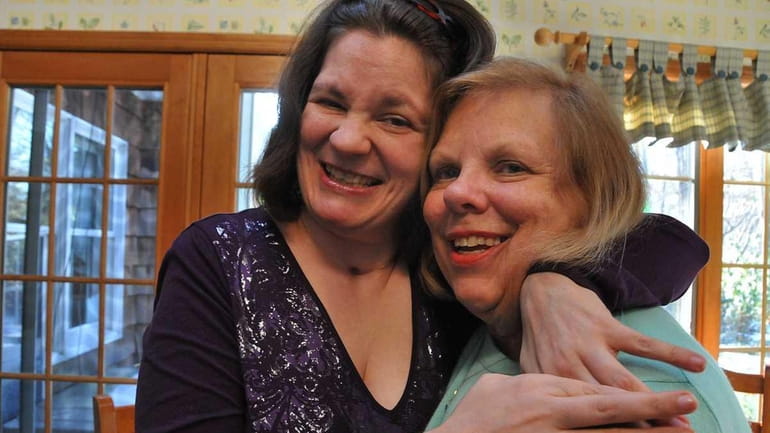A family's story, lessons for all

Michelle Martone and her mother Marilyn, at their Sea Cliff home Credit: Newsday/Danielle Finkelstein
Before a car driven by an elderly woman mowed down Michelle Martone at the University of Chicago, she was a brilliant, funny young woman. She still is.
But that 1998 accident left her near death, with little prospect of recovering the full use of her Phi Beta Kappa brainpower. Still, her parents, Larry and Marilyn, refused to accept a life in a nursing home for her. They brought her home to Sea Cliff, and Marilyn applied all the energy of motherhood, plus her training as a theologian and health ethicist, to getting for Michelle the care she needed.
Then Marilyn wrote a book about that process. Last Saturday, at the Sea Cliff Library, she gave a talk about Michelle, their family and the book. It's the work of a mother and an academic, trying to do justice to both roles in one manuscript. As a result, an academic press found it too emotional, and the trade press saw it as not emotional enough. So she self-published "Over the Waterfall."
As she talked on Saturday, Larry arrived with Michelle, in a wheelchair, but fresh from her horseback-riding therapy. (Her first experience of this therapy showed that she still has the sense of humor that I'd first seen in her years ago. The book describes it this way: "She loved the horse she rode, named Yankee, even though she kept telling the therapists that she would prefer to ride a horse named Met, in order to be faithful to her father's baseball allegiance.")
As the talk went on, Michelle became a chorus of one at the back of the room, her voice still impaired by her traumatic brain injury, but her comic timing intact, eliciting laughter with the comments she added to her mother's talk.
And the laughter helped. The issues the Martone family story raises are profoundly serious.
One is the matter of what health care covers. People injured as badly as Michelle can "plateau," reach a point where health insurers say further rehabilitation is of no avail -- and they stop paying. But the Martones rejected the idea that Michelle had reached a plateau. They kept climbing higher.
She is covered for as many high-tech tests as she needs, such as CT scans and MRIs, but not the low-tech stuff, such as aides' services and rehab. Her family has to find the money to cover those, with help from the proceeds of an insurance settlement they won.
"The only reason Michelle has the care that she has is because there was a major lawsuit, but not many people get hit by a woman driving a company car," Marilyn said. "This is why most of these people are put in nursing homes." Now, she wants Congress to have a serious debate about this.
Right after the accident, with Michelle unconscious and near death, the issue of transplants also became vivid for her mother. She didn't have to make that choice, but it helped crystallize the question. "We ignore the emotional turmoil that families go through when making these decisions," Marilyn said, "which is why I strongly, strongly believe transplants need to remain gifts and not become commodified."
Her daughter's traumatic brain injury also raises the matter of many young Americans returning from Iraq and Afghanistan with similar wounds -- plus post-traumatic stress disorder. One of those in the audience, Michelle's case manager, Barbara Hardt, points to an organization called The Soldiers Project, which tries to link damaged service members with volunteer professionals.
These broad societal concerns clearly need more thought. But for all the ethical and public policy issues the Martones' story raises, it remains a very human tale of a family that refused to let go of their brilliant, funny daughter.
"What we see now, in my eyes, is just miraculous," Hardt said. "She's far from finished."
